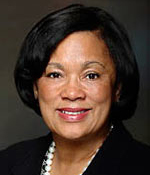The term health disparities is defined as the gaps in the quality of health and health care across racial, ethnic, sexual orientation and socioeconomic groups. Addressing health disparities has been a long-standing public policy issue. African Americans, and other communities of color, have historically had less access to quality health care, poorer health outcomes, and high mortality rates for a myriad of reasons. Some include lack of health insurance coverage (due to cost, poor information, or misunderstanding), distrust of the medical profession, and cultural norms.
NBCSL believes that the vitality of our communities begins with their health. By focusing on preventative measures, screenings, and coordinated care (as called for under the Affordable Care Act) we can both combat health disparities and greatly improve the quality of life for all Americans. The following legislators share this focus and have made health a priority in their respective states and districts.
 Senator Toni Nathaniel Harp (CT)
Senator Toni Nathaniel Harp (CT)
Serving her 11th consecutive term in the Connecticut Senate, Senator Toni Nathaniel Harp is currently the Deputy President Pro Tempore and Chair of the Appropriations Committee. Throughout her tenure, she has prioritized many initiatives including, managed care reform, insurance for uninsured children, raising the minimum wage, economic development for cities, and the safety of children in child care.
As part of her efforts to support the health of her constituents, Senator Harp introduced SB 1026 along with other Senate members to “improve health outcomes and ensure Medicaid recipients have timely access to an adequate network of health care providers in time for the expansion of Medicaid under the Affordable Care Act.” Outlined in part of the bill is a charge for the state government to establish the Council on Medical Assistance Program Oversight to study obstacles to achieving an adequate health care provider network for Medicaid recipients. The bill requires that this council recommend strategies to improve access to such providers, and health outcomes for such recipients across racial and ethnic lines, no later than January 1, 2014. The bill passed both chambers of the Legislature in May of 2013 and was signed into law in June of this year. Senator Eric D. Coleman (CT), an NBCSL member and Deputy President Pro Tempore, was another bill sponsor.
 Senator Rodney Ellis (TX)
Senator Rodney Ellis (TX)
In 1990, Senator Rodney Ellis was elected to the Texas Senate, and during his tenure he has passed over 600 bills. He is also the founder of the Texas Legislative Internship Program (TLIP). Since TLIP’s inception, it has become the largest legislative internship program in the state. Senator Ellis has raised over $2 million in funding for the program, giving over 500 young people the opportunity to make a difference in Texas politics and public policy. Three former TLIP participants are currently members of the Texas House of Representatives. Senator Ellis serves as the Chair of the Open Government Legislative Committee and is a member of the State Affairs, Natural Resources, and Transportation Committees.
During the 2013 Legislative Session, Senator Ellis introduced SB 1693. An act “relating to the management of federal and state funds for the Texas Safe Routes to School (SRTS) program, and other programs directed toward the accommodation of pedestrians, bicyclists, persons with disabilities, children, senior citizens, users of public transportation, and persons of all ages and abilities,” this bill looks to promote physical activity through the expansion of sidewalks and other public thorough fares. Read into session on March 25, 2013, the bill is currently in the state Transportation Committee for review.
 Senator Mattie Hunter (IL)
Senator Mattie Hunter (IL)
Since 2003, Senator Mattie Hunter has served in the Illinois Senate. She is currently the Majority Caucus Whip and Chairperson of the Senate Human Services Committee, Vice-Chair of the Public Health Committee. She also serves on the Redistricting and Environment Committees. During her career, Senator Hunter has passed over 100 bills in the areas of breast cancer, childhood vaccines, environmental issues, and education.
During the 2013 Legislative Session, Senator Hunter introduced HB 1046, regarding medical aid eligibility for incarcerated individuals not already enrolled for health care assistance. The measure allows prisoners to apply for medical aid assistance any time while they are in prison instead of having to wait until 30 days before they are released. Senator Hunter introduced the bill because she felt quality medical care is what everyone deserves. “Whether in jail or not, you are a person and your health is valuable and a priority,” said Senator Hunter about the bill. Passed by both the House and Senate, HB 1046 was signed into law in August of 2013. Senator Hunter was the primary sponsor of this bill with NBCSL members Representatives Camille Lilly, Mary E. Flowers, and Derrick Smith being among the co-sponsors.
 Representative Byron Rushing (MA)
Representative Byron Rushing (MA)
First elected to the House of Representatives in 1982, Representative Byron Rushing now serves as the Second Assistant Majority Leader and the Chair of the Massachusetts Black and Latino Legislative Caucus. During his service in the Legislature, he has chaired the committees on Counties, Local Affairs, Public Service, and Insurance. When he chaired the Committee on Insurance, he was the chief sponsor of health reform that sought to end pre-existing condition refusals by insurance companies, and he chaired numerous meetings of diverse stakeholders leading to the successful passage of non-group insurance reform law. Representative Rushing’s priorities are human and civil rights and liberties; local human, economic and housing development; environmental justice; and health care.
In the current 188th Legislative Session, Representative Rushing introduced bill H.2071 titled, “An act to eliminate racial and ethnic health disparities in the Commonwealth.” This legislation seeks to establish an office of health equity within the executive office of health and human services and an advisory health disparities council. As outlined in the legislation, the office “shall set goals for the reduction of disparities and prepare an annual plan for the commonwealth to eliminate disparities.” Furthermore, the office shall “facilitate development of interagency initiatives to address the social and economic determinants of health and key health disparities issues including, but not limited to, healthcare access and quality; housing availability and quality; transportation availability, location and cost.” In October of this year, the bill was referred to the Massachusetts House Ways and Means committee where it now remains with amendments pending.
 Senator Vincent Hughes (PA)
Senator Vincent Hughes (PA)
A member of the Pennsylvania State Senate since November 1994, Senator Vincent Hughes served as a member of the Pennsylvania House of Representatives from 1987 until he began his tenure in the Senate. While a member of the Pennsylvania House, Senator Hughes chaired the Pennsylvania Legislative Black Caucus from 1991 to 1994. Senator Hughes currently serves as Democratic Chair of the Appropriations Committee and member of the Intergovernmental Operations and Rules & Executive Nominations Committees.
During the 2013 Legislative Session, Senator Hughes introduced Senate Bill 5, the Community Based Health Care Program Act, which aims to create a community-based health care program in the Pennsylvania Department of Health. More specifically, the new program was established to “(1) expand and improve health care access and services, such as preventive care, chronic care and disease management, prenatal, obstetric, postpartum and newborn care, dental treatment, behavioral health and pharmacy services; (2) reduce unnecessary utilization of hospital emergency services by providing an effective alternative health care delivery system; and (3) encourage collaborative relationships among community-based health care clinics, hospitals and other health care providers.” Now known as Pennsylvania Act No. 10, this legislation became law on May 21, 2013.






